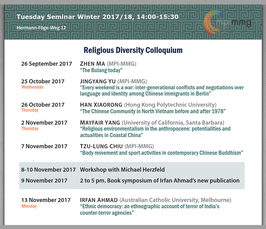"Ethnic democracy: an ethnographic account of terror of India’s counter-terror agencies"
Religious Diversity Colloquium Winter 2017/18
- Datum: 13.11.2017
- Uhrzeit: 14:00 - 15:30
- Vortragende(r): Irfan Ahmad (Melbourne)
- Irfan Ahmad is a Senior Research Fellow working on a book manuscript provisionally titled Terrorism in Question: Toward An Anthropological Approach. Until January 2017, he was Associate Professor of Political Anthropology at Australian Catholic University, Melbourne. Author of Islamism and Democracy in India (Princeton University Press, 2009), short-listed for the 2011 ICAS Book Prize for the best study in the field of Social Sciences, his second book Religion As Critique: Islamic Critical Thinking from Mecca to the Marketplace is forthcoming in 2017 from the University of North Carolina Press. Religion As Critique enunciates the ethnic foundation of the Enlightenment to ethnographically draft an alternative genealogy of critique in Islamicate traditions of south Asia. Ahmad is founding Co-Editor of Journal of Religious and Political Practice (Taylor & Francis). With Natalie Doyle, he co-edited (Il)liberal Europe: Islamophobia, Modernity and Radicalization (Routledge, 2017) and is currently co-editing (with Pralay Kanungo, Leiden University/JNU) a volume on the 2014 Indian elections.
- Ort: MPI-MMG, Hermann-Föge-Weg 12, Göttingen
- Raum: Conference Room

For more details please contact vdvoffice(at)mmg.mpg.de.
This paper demonstrates how a community stigmatized as producer of terrorism felt terrorized. It focuses on a conference, organized after the bomb blasts in BJP’s 2013 election rally in Patna by Inṣāf Manch “for justice against the anti-democratic and repressive actions of the NIA [National Investigation Agency]”, which conducted raids to arrest “terrorists.” My principal contention is that the premise that democracy is antithetical to terror is flimsy because terror assigned to terrorists also constitute democracy –in India and West alike. The paper proceeds as follows. Against the dominant views according to which BJP held its rally in Bihar ruled by “enemy”, Nitish Kumar, in part I, I show that it was the blasts, which fashioned the enemy as “Islamic terrorism.” TV channels first showed the police arrest a Hindu youth. Soon, however, media and political parties began to mobilizationally blame Muslims thereby ethnifying democracy. Part II zooms in on a “terrorist” NIA arrested as a suspect for the Patna blasts. Part III discusses the formation and trajectory of Inṣāf Manch. Activating anthropology’s reformulated goal, the final part transcends academic obsession with “the real” to describe “the true” (Didier Fassin) to imagine another world.